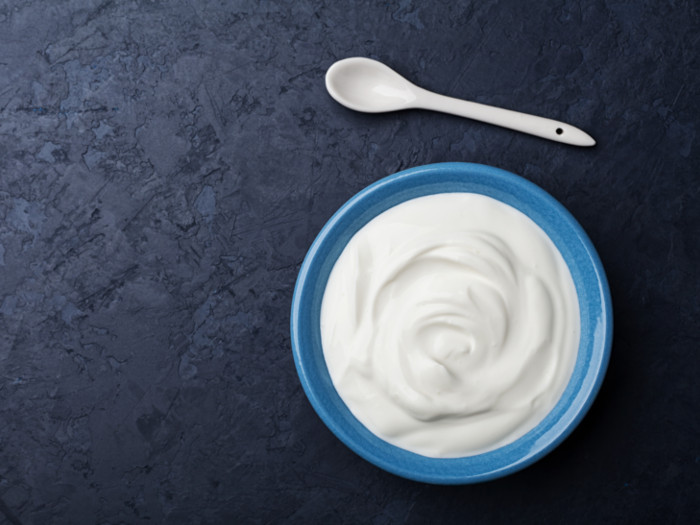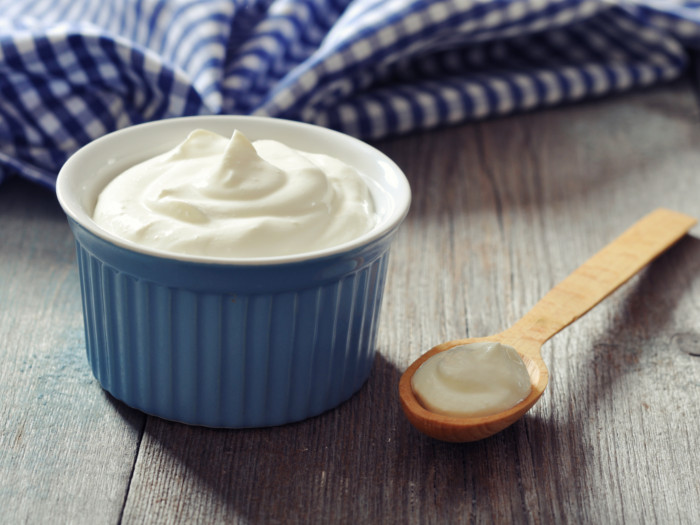The use of Greek yogurt in cooking is not limited to Greece, particularly because it is such a nutrient-dense and delicious ingredient for so many meals.
What is Greek Yogurt?
Greek yogurt is a variety of yogurt that has been additionally strained, thus removing most of the liquid whey and lactose from the yogurt. For this reason, Greek yogurt is often denser but has fewer carbs and less sugar than the regular variety of yogurt. Furthermore, the removal of certain components leaves the yogurt with a much more tart or tangy taste. Greek yogurt has exponentially increased in popularity in recent years, although it has been a common ingredient in cooking in Mediterranean and Middle Eastern countries for centuries. [1]
While some people believe that this form of yogurt is okay for those with lactose intolerance, that isn’t completely true. The amount of lactose in this “strained” yogurt is certainly lower than in regular yogurt, but it is not completely free of that form of sugar. If you are highly sensitive to lactose in your diet, you still may have a negative reaction to this yogurt. Generally speaking, however, there is no denying that Greek yogurt is a healthier option, delivering more of the nutrients your body needs, and even helping your body absorb nutrients more effectively.

Greek yogurt is a great alternative to regular yogurt. Photo Credit: Shutterstock
Serving Size : Nutrient Value Water [g] 83.56 Energy 73 Energy [kJ] 305 Protein [g] 9.95 Total lipid (fat) [g] 1.92 Ash [g] 0.63 Carbohydrate, by difference [g] 3.94 Sugars, total including NLEA [g] 3.56 Lactose [g] 2.92 Galactose [g] 0.64 Calcium, Ca [mg] 115 Iron, Fe [mg] 0.04 Magnesium, Mg [mg] 11 Phosphorus, P [mg] 137 Potassium, K [mg] 141 Sodium, Na [mg] 34 Zinc, Zn [mg] 0.6 Copper, Cu [mg] 0.02 Manganese, Mn [mg] 0.01 Selenium, Se [µg] 12.4 Vitamin C, total ascorbic acid [mg] 0.8 Thiamin [mg] 0.04 Riboflavin [mg] 0.23 Niacin [mg] 0.2 Pantothenic acid [mg] 0.47 Vitamin B-6 [mg] 0.06 Folate, total [µg] 12 Folate, food [µg] 12 Folate, DFE [µg] 12 Choline, total [mg] 15.2 Vitamin B-12 [µg] 0.52 Vitamin A, RAE [µg] 90 Retinol [µg] 90 Carotene, beta [µg] 6 Vitamin A, IU [IU] 309 Lutein + zeaxanthin [µg] 1 Vitamin E (alpha-tocopherol) [mg] 0.04 Vitamin K (phylloquinone) [µg] 0.2 Fatty acids, total saturated [g] 1.23 4:0 [g] 0.05 6:0 [g] 0.04 8:0 [g] 0.02 10:0 [g] 0.07 12:0 [g] 0.06 14:0 [g] 0.19 15:0 [g] 0.02 16:0 [g] 0.57 17:0 [g] 0.01 18:0 [g] 0.2 20:0 [g] 0 Fatty acids, total monounsaturated [g] 0.49 14:1 [g] 0.02 16:1 [g] 0.03 16:1 c [g] 0.03 17:1 [g] 0 18:1 [g] 0.43 18:1 c [g] 0.38 20:1 [g] 0 Fatty acids, total polyunsaturated [g] 0.08 18:2 [g] 0.07 18:2 n-6 c,c [g] 0.05 18:2 CLAs [g] 0.01 18:3 [g] 0.01 18:3 n-3 c,c,c (ALA) [g] 0.01 20:3 [g] 0 20:3 n-6 [g] 0 20:4 [g] 0 Fatty acids, total trans [g] 0.06 Fatty acids, total trans-monoenoic [g] 0.05 16:1 t [g] 0.01 18:1 t [g] 0.05 18:2 t not further defined [g] 0.01 Fatty acids, total trans-polyenoic [g] 0.01 Cholesterol [mg] 10 Tryptophan [g] 0.03 Threonine [g] 0.22 Isoleucine [g] 0.29 Leucine [g] 0.53 Lysine [g] 0.47 Methionine [g] 0.16 Cystine [g] 0.05 Phenylalanine [g] 0.29 Tyrosine [g] 0.27 Valine [g] 0.43 Arginine [g] 0.16 Histidine [g] 0.13 Alanine [g] 0.23 Aspartic acid [g] 0.42 Glutamic acid [g] 1.03 Glycine [g] 0.13 Proline [g] 0.62 Serine [g] 0.33 Sources include : USDA [2]
Greek Yogurt Nutrition
Greek yogurt is a nutrient powerhouse, with 15-20 grams of protein in a single 6-ounce serving, as well as very few carbohydrates, which is ideal for people wanting to cut down that part of their intake. It also delivers high levels of potassium, calcium, vitamin B-12, vitamin B-6, and magnesium. It also contains valuable probiotics for stomach health, as well as a low level of sodium and cholesterol, as compared to regular yogurt. There are only 100 calories in a single container of Greek yogurt (approx. 170 grams). [3]
Benefits of Greek Yogurt
The most impressive benefits of Greek yogurt include the following:
- Improving your gut health
- Boosting the metabolism
- Aiding muscle growth
- Strengthening your bones
Protein Level
With such a dense concentration of protein, this yogurt can help you feel full for longer and provide reliable energy to the body. This can help you lose weight by reducing cravings and overeating. [4]
Carbohydrates
If you are trying to reduce your carbohydrate intake, as many people are, this Greek yogurt option can help reduce the intake of those simple sugars and keep your diet on track. [5]
Gut Health
With a high concentration of probiotics, this yogurt can help rebalance the intestinal flora, which can aid your digestive efficiency, and reduce inflammation, constipation, bloating, and cramping. [6]
Lactose Reduction
Many people have lactose intolerance, but some are able to consume and metabolize small amounts. This tangy yogurt variety provides an option for people suffering from this intolerance. [7]
Bone Health
High levels of calcium and other key minerals mean that Greek yogurt can help to improve bone mineral density and slow the progression of osteoporosis as we age. [8]
Muscle Growth
Having so much protein packed into every bit, this type of yogurt is excellent for increasing muscle growth. Protein is the building block of muscle that your body needs to bulk up. [9]
How to Make Greek Yogurt?
Making your own homemade Greek yogurt is definitely possible, although most people would rather buy their own at the store. However, this yogurt can be as much as twice the cost of regular yogurt, so making it at home is becoming more popular!

Creamy Greek Yogurt Recipe
Ingredients
- 4 cups reduced-fat milk
- 2 tbsp yogurt starter culture
Instructions
- Pour the milk into a large pot on the stove.
- Bring the milk close to a boil, but remove from heat when the edges begin to bubble.
- Cover and set aside this pot for approximately 45 minutes.
- Turn on the oven to a low warm setting (approx. 110 degrees Fahrenheit).
- Stir in the live yogurt culture into the milk.
- Cover the pot and put it into the oven for 5-10 hours, never letting the temperature rise above 110 degrees.
- Once the yogurt thickens, remove it from the oven and pour through a cheesecloth tied over a pot.
- Leave the pot (with cheesecloth in place) in the refrigerator overnight.
- In the morning, discard the whey in the bottom of the pot, store the Greek yogurt in a jar in the fridge.

Notes
Greek Yogurt vs Regular Yogurt
There are a few main differences between Greek yogurt and regular yogurt which include:
- Different nutrient density- Greek yogurt has twice as much protein, half the sodium, and half the sugar, as well as fewer carbs than regular yogurt. The “strained” variety also has far fewer carbohydrates than the regular type.
- When it comes to including one of these yogurts in your food, Greek yogurt also tends to be more versatile, as it can be great for both savory and sweet dishes, whereas normal yogurt is typically reserved for sweet preparations. [10]

